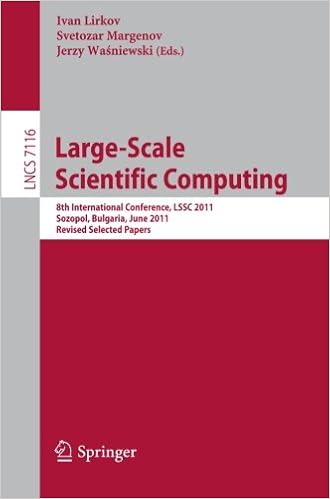
By Ivan Lirkov, Svetozar D. Margenov, Jerzy Wasniewski
ISBN-10: 3642298427
ISBN-13: 9783642298424
ISBN-10: 3642298435
ISBN-13: 9783642298431
This e-book constitutes the completely refereed post-conference complaints of the eighth overseas convention on Large-Scale medical Computations, LSSC 2011, held in Sozopol, Bulgaria, in June 2011. The seventy four revised complete papers provided including three plenary and invited papers have been conscientiously reviewed and chosen from various submissions. The papers are prepared in topical sections on strong multigrid, multilevel and multiscale, deterministic and stochastic equipment for modeling hugely heterogeneous media, complex tools for delivery, regulate and unsure platforms, purposes of metaheuristics to large-scale difficulties, environmental modelling, huge scale computing on many-core architectures, multiscale business, enviromental and biomedical difficulties, effective algorithms of computational geometry, excessive functionality Monte Carlo simulations, voxel established computations and contributed papers
Read or Download Large-Scale Scientific Computing: 8th International Conference, LSSC 2011, Sozopol, Bulgaria, June 6-10th, 2011. Revised Selected Papers PDF
Best international_1 books
This ebook constitutes the completely refereed post-conference complaints of the eighth foreign Symposium on Parameterized and designated Computation, IPEC 2013, in Sophia Antipolis, France, in September 2013. The 29 revised complete papers awarded have been conscientiously reviewed and chosen from fifty eight submissions.
Get XVIITH International Congress on Mathematical Physics PDF
The foreign Congress on Mathematical Physics is an important convention in its box that draws a truly vast spectrum of researchers. Held each 3 years, it offers an summary of contemporary advancements and achievements in mathematical physics. This quantity provides the plenary lectures and invited topical consultation lectures from the XVIIth ICMP, which used to be held in Aalborg, Denmark, August 2012.
First International Tainan-Moscow Algebra Workshop: by Y. Fong, U. Knauer, A. V. Mikhalev PDF
The sequence is aimed in particular at publishing peer reviewed stories and contributions provided at workshops and meetings. each one quantity is linked to a selected convention, symposium or workshop. those occasions hide numerous issues inside natural and utilized arithmetic and supply up to date insurance of recent advancements, equipment and functions.
- System Configuration Management: 19th International Symposium, SCM-9 Toulouse, France, September 5–7, 1999 Proceedings
- International Behavioural and Social Sciences Library: Psychological Illness: A community study
- Algorithmic Aspects of Wireless Sensor Networks: Fourth International Workshop, ALGOSENSORS 2008, Reykjavik, Iceland, July 2008. Revised Selected Papers
- Implementation and Application of Automata: 20th International Conference, CIAA 2015, Umeå, Sweden, August 18-21, 2015, Proceedings
- Informatics in Control, Automation and Robotics: Selcted Papers from the International Conference on Informatics in Control, Automation and Robotics 2008
- Advances in Web-Based Learning – ICWL 2016: 15th International Conference, Rome, Italy, October 26–29, 2016, Proceedings
Extra resources for Large-Scale Scientific Computing: 8th International Conference, LSSC 2011, Sozopol, Bulgaria, June 6-10th, 2011. Revised Selected Papers
Example text
Highly) varying thermal conductivities in compound media. Thus, the convergence rates of iterative methods like conjugate gradients deteriorate as the mesh parameters decrease and the variations in problem parameters increase. One is, therefore, interested in designing preconditioners yielding preconditioned systems whose condition numbers are robust with respect to problem and mesh parameters. Commonly used approaches include domain decomposition methods (cf. g. [8,12]) and multilevel/multigrid algorithms (cf.
The goal is to obtain estimates of u ¯−u ¯h in the L2 and L∞ norms. We suppose that second-order sufficient conditions hold at u ¯. Then, the following estimate holds for problems (Ph,0 ) and (Ph,1 ) u ¯ − u¯h L∞ (Ωh ) ¯−λ ¯h + λ L∞ (Ωh ) + y¯ − y¯h L∞ (Ωh ) + ϕ¯ − ϕ¯h L∞ (Ωh ) ≤ C h. The same estimate is obtained in the L2 norm. In the case of problem (Ph,2 ), we have an error of order h2 in the L2 norm and of order h2−n/p |log h| in the L∞ norm. 24 4 E. Casas, R. Herzog, and G. Wachsmuth Implementation and Numerical Examples In this section we give some details concerning the implementation along with some numerical results.
Pechstein 0 where γΩ : H 1 (Ω) → H 1/2 (∂Ω) refers to the Dirichlet trace operator from the 0 domain Ω to its boundary and H01 (Ω) = {v ∈ H 1 (Ω) : γΩ v = 0}. We require ∞ that the coefficients A, b, c are L (Ω) and that there exists a unique solution of (2). Assume now that we are given a finite decomposition T of Ω into mutually disjoint Lipschitz polyhedra. As opposed to a standard finite element method, we do not require the existence of a reference element to which all elements T ∈ T can be mapped, but rather allow T to contain an arbitrary mixture of polyhedral element shapes.
Large-Scale Scientific Computing: 8th International Conference, LSSC 2011, Sozopol, Bulgaria, June 6-10th, 2011. Revised Selected Papers by Ivan Lirkov, Svetozar D. Margenov, Jerzy Wasniewski
by Michael
4.4



